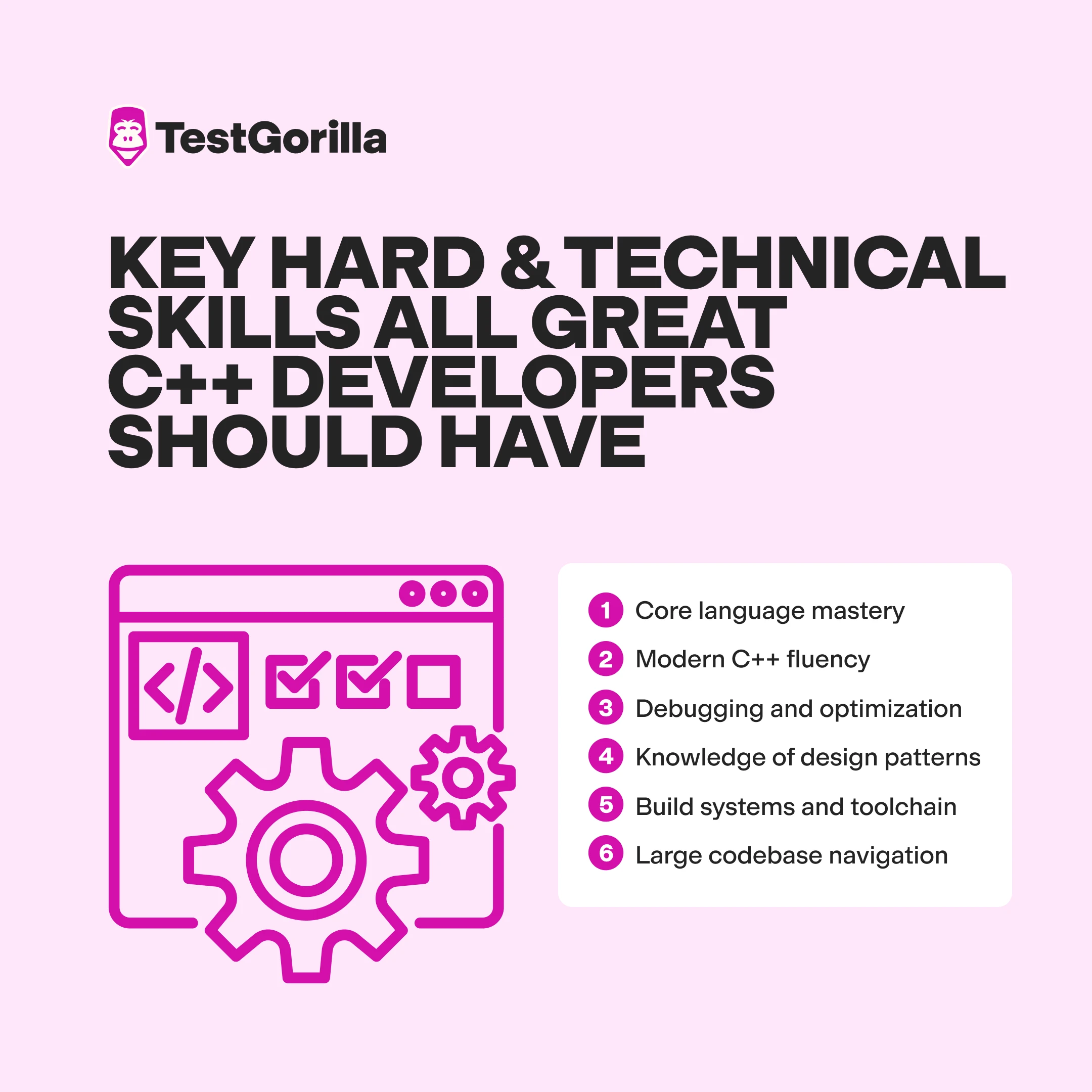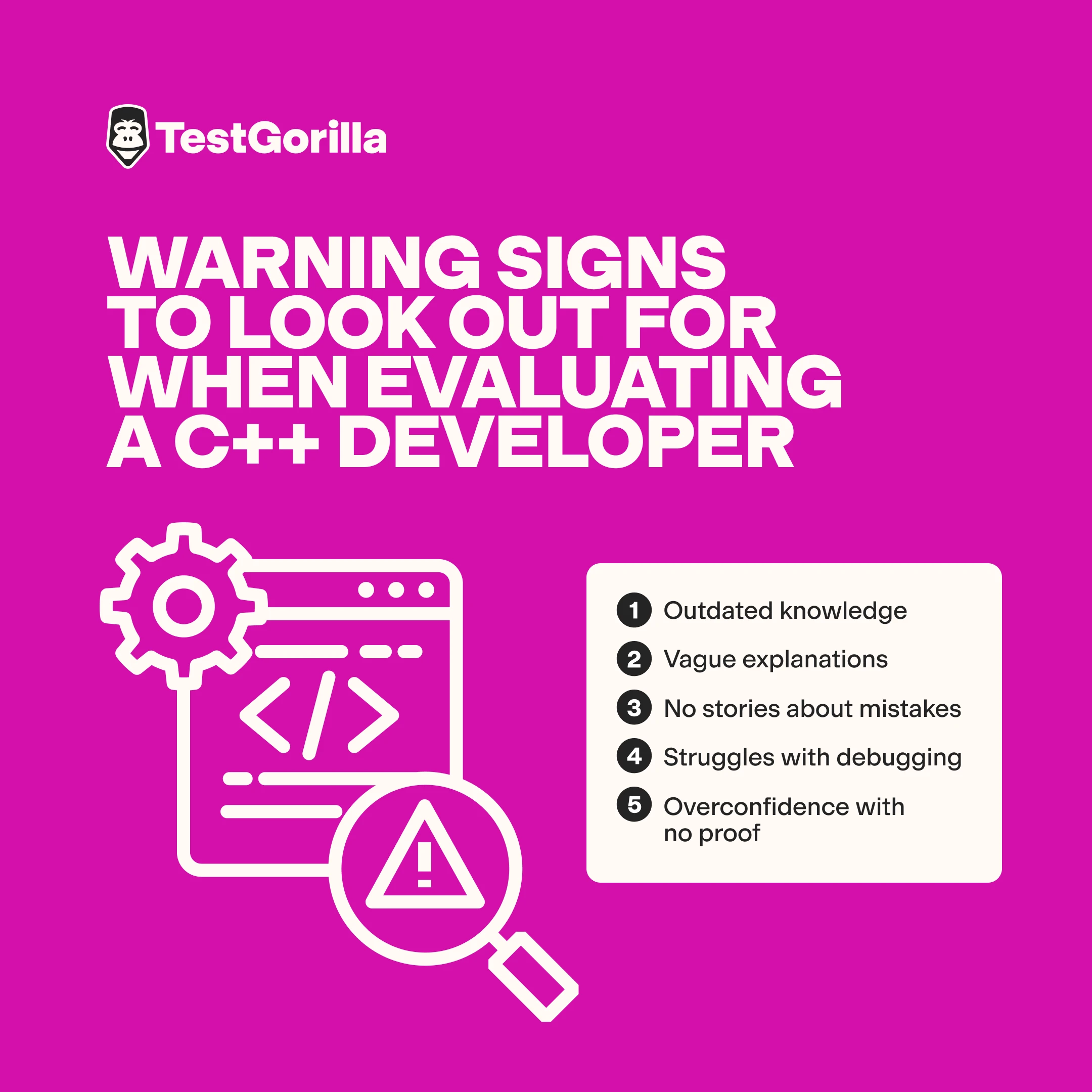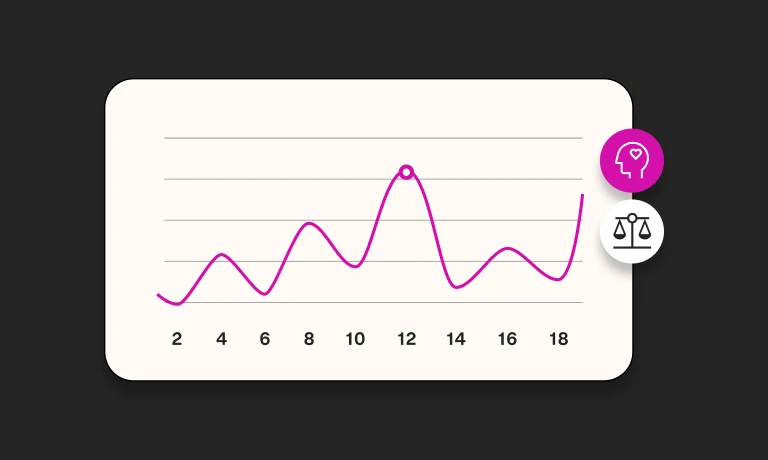Hiring a great C++ developer requires you to stop relying on outdated resumes and start focusing on real-world skills. Many candidates can talk the talk, but how do you know they can actually write modern, efficient, and safe code?
This guide will show you how to look past the keywords and build a hiring process with the right C++ coding tests, so you can confidently identify a C++ developer with the skills your team needs.
Why hire C++ developers today?
Even with a flood of newer programming languages, C++ holds its ground. As of June 2025, it’s the second most popular language globally, according to the TIOBE Index. Why? Because for certain jobs, nothing else will do.
Here’s where C++ is still the king:
Performance-sensitive systems: In high-frequency trading (HFT), where every nanosecond counts, C++ is the only real option. The same goes for high-end game development, where it powers demanding engines like Unreal Engine and CryEngine, which require real-time graphics and complex physics.
Legacy software maintenance: There are trillions of lines of C++ code running the world’s enterprise systems and browsers. In these cases, you need an experienced developer to maintain and modernize that code, not just start from scratch.
Embedded and real-time systems: Think cars, airplanes, and IoT devices. They all benefit from the speed and control that C++ provides when CPU resources are tight. While its ancestor, C, has long been the most widely used language in resource-constrained systems, C++ usage has grown significantly, now accounting for 20% to 25% of projects in this space.
Systems programming and infrastructure: The biggest names in tech – Google, Meta, and Amazon – all use C++ for their core infrastructure, like databases, operating systems, and high-performance cloud components. It's also a viable choice for mobile app development.
What makes a great C++ developer?
A great C++ developer possesses a combination of specific hard and soft skills to navigate the language's complexity and effectively apply it in the real world. Let’s explore these skills below.
Key hard and technical skills
Core language mastery: They need to be fluent in memory management, pointers, templates, and the Standard Template Library (STL). A good developer knows why you’d use a std::vector over a std::list for better cache performance. When hiring, you can check this with a Coding: Data Structures – Arrays test.
Modern C++ fluency: C++ continues to evolve, with significant revisions such as C++17, C++20, and C++23 introducing new concepts, standards, and structures.
A candidate who isn't proficient in the latest standards can be a major liability since they can't leverage new features expressly designed to create safer, more efficient, and more maintainable software. Therefore, they are more likely to write code with security vulnerabilities and performance issues.
With that in mind, developers must have a practical command of:
Smart pointers. They need to know std::unique_ptr for exclusive ownership, std::shared_ptr for shared ownership, and std::weak_ptr to break reference cycles.
The RAII idiom. Resource Acquisition Is Initialization (RAII) is a crucial concept for writing safe C++. It dictates that resource ownership for items such as memory, file handles, or network sockets should be tied to the lifetime of an object, ensuring cleanup and preventing memory leaks.
Move semantics, lambda expressions, and auto type deduction.
Debugging and optimization: They should be experts with tools like GDB or Valgrind, which are used to identify performance bottlenecks and memory leaks. For high-performance jobs, they need to know low-level tricks, such as cache warming and prefetching, which minimize memory access time in latency-critical applications.
Knowledge of design patterns: They should be familiar with foundational object-oriented programming design patterns like Factory, Singleton, and Observer. This knowledge is required to build complex architectural ideas using the building blocks of C++.
Build systems and toolchain: Every professional C++ developer needs to know their tools. Experience with CMake is now the industry standard for managing builds. A Git test is also a good idea to check their version control skills.
Large codebase navigation: Great developers can jump into a huge, complex system and figure it out. Writing code that is easy for others to read and maintain is a vital skill that shows an understanding of the importance of clean code.
Domain-specific expertise
A C++ developer is rarely a generalist. Their value comes from a deep understanding of a specific domain. The skills needed for game development are vastly different from those needed for HFT. Here's a summary of some of the relevant domain-specific expertise:
| Game development | High-frequency trading | Embedded systems |
Primary goal | Real-time interactivity, high frame rates | Ultra-low latency, high throughput | Determinism, reliability, efficiency |
Key concepts | 3D math (vectors, matrices), physics, rendering pipelines | Lock-free concurrency, cache optimization, kernel bypass | Hardware register manipulation, interrupt handling, RTOS scheduling |
Common tools | Unreal Engine, DirectX, Vulkan, graphics profilers | Custom low-level libraries, network analyzers | JTAG/SWD debuggers, oscilloscopes, FreeRTOS, Zephyr |
Essential soft skills
Problem-solving and critical thinking: C++ problems are often complex puzzles. You need someone with a systematic way of thinking who can break down challenges. A candidate's problem-solving skills are key, as is their ability to think critically. A Critical Thinking test can give you great insight here.
Attention to detail: In C++, a tiny mistake like a pointer error can cause a huge failure. You need someone who is meticulous. An Attention to Detail test can help you screen for this trait.
Communication: Your developer must be able to explain complex technical ideas clearly to the rest of the team. Your ability to assess communication skills during an interview is valuable here, and you can also use a Communication Skills test to find candidates who excel at this.
The best insights on HR and recruitment, delivered to your inbox.
Biweekly updates. No spam. Unsubscribe any time.
Where to find qualified C++ developers
You won't find the best C++ talent on generic job boards. You have to go where they are. Consider the following options:
Open-source contributors: GitHub essentially acts as a living portfolio these days. Look for developers contributing to C++ projects in your industry. Check out their code quality and how they handle feedback in pull requests.
Engineering communities:
Stack Overflow: Look for users with high reputation scores in C++ tags.
Reddit: Subreddits like r/cpp and r/gamedev are full of high-level technical conversations.
Mailing lists: For top experts, check out the public mailing lists for projects like Boost, LLVM, or the ISO C++ standards committee.
Freelance and remote talent platforms: Websites like Toptal, Gigster, and We Work Remotely have pools of vetted C++ developers.
Referrals and professional networks: Ask your team for recommendations. Good engineers know other good engineers. You could even go to C++ conferences like CppCon and Meeting C++ to meet skilled developers in person.
How to assess C++ skills effectively
You can't trust a resume or a whiteboard puzzle to tell you if someone can actually code in C++. The only way to know for sure is to test their skills with practical, real-world tasks. This is a great strategy, even for non-technical managers who need to hire top programmers.
Using coding tests at the start of your process lets you objectively see who’s got the skills, as well as screen out unqualified applicants before you waste time on an interview.
A good assessment process should check if a candidate can:
Manage memory and resources: Give them some old C-style code and ask them to refactor it using smart pointers and the RAII idiom.
Design a clean API: Ask them to design the public interface for a class to test their grasp of const-correctness and encapsulation.
Debug real code: Give them a buggy code snippet and see if they can fix it. Our Coding: Debugging test is perfect for this.
Use the STL effectively: Give them a problem and ask them to solve it using the best STL containers and algorithms for the job.
In the interview, ask C++ interview questions that force them to explain trade-offs, not just give definitions. For instance:
Weak question: "What is a virtual function?"
Strong question: "Describe the performance overhead of using virtual functions. In what scenarios might you prefer static polymorphism, like the Curiously Recurring Template Pattern (CRTP)?"
Red flags to watch out for
Keep an eye out for these warning signs during your hiring process:
Outdated knowledge: Their experience is all pre-C++11. They talk about manual memory management and use C-style casts. This "C-with-classes" mindset will introduce technical debt into your modern codebase.
Vague explanations: They can’t explain why they would make a certain technical choice, like why they’d use one data structure over another.
No stories about mistakes: Every good developer has a story about a bug that took them days to solve. If they can’t talk about their mistakes and what they learned, that’s cause for concern.
Struggles with debugging: If they can’t systematically figure out a bug in a coding challenge, they will struggle on the job.
Overconfidence with no proof: They talk a big game but have no code samples on GitHub or detailed project examples to back it up.
How to structure your hiring process
A good, consistent process helps you evaluate every candidate fairly and make a much better hiring decision. Adopting the following five-step plan will help you improve your technical hiring process from start to finish.
Step 1: Define the role clearly
First, figure out exactly what you need. Are you hiring a systems developer to work on an OS kernel, or an application developer to build a user-facing app? Since the skill sets are completely different, hiring the wrong one would be a costly mistake.
Be specific about the domain, too – is this for game development, HFT, or real-time systems? Each has its own unique challenges and required skills. Knowing how to write great job descriptions is the first step to attracting the right people.
Step 2: Screen with a C++ assessment to filter technical fit
Begin with a skills assessment to gather objective data on each candidate. Combine a C++ coding test with a Communication test and a Problem-Solving test. This helps you to overcome unconscious bias and focus on what matters: the candidate's ability.
Step 3: Conduct a structured technical interview
Use the assessment results to guide your interview questions. Have your senior engineers sit in on this interview – they are the best people to judge a candidate’s technical depth. Use live debugging or system design questions to see how they think on their feet.
Step 4: Use a short coding project or a paid trial task if needed
For a senior role, a small, paid take-home project can show you how a candidate tackles a realistic problem. Keep it short to respect their time, and pay them for their work to show you value it.
Step 5: Validate collaboration skills and plan for onboarding
The final interview should be about how they work with others. Ask behavioral questions to see how they collaborate, handle feedback, and solve problems as part of a team. This ensures they are a good fit for your team’s culture and will make a positive contribution.
A successful hire also needs a great onboarding plan. A senior C++ developer's biggest challenge is often understanding a large, complex codebase. Set them up for success by:
Assigning a dedicated senior mentor for the first 90 days.
Scheduling architectural deep dives to explain the system's design.
Giving them small, early wins to help them learn the codebase and build momentum.
Hire great C++ developers with TestGorilla
Hiring the right C++ developer is best done by dropping outdated methods and focusing on skills. You need a process that clearly defines the role, uses objective assessments to test real-world abilities, and interviews to dig deep into their technical understanding. This is how you find the engineers who can build the robust, high-performance systems you need.
Ready to find your next great C++ developer? Try TestGorilla for free to start building your custom C++ skills assessment today.
You've scrolled this far
Why not try TestGorilla for free, and see what happens when you put skills first.




















